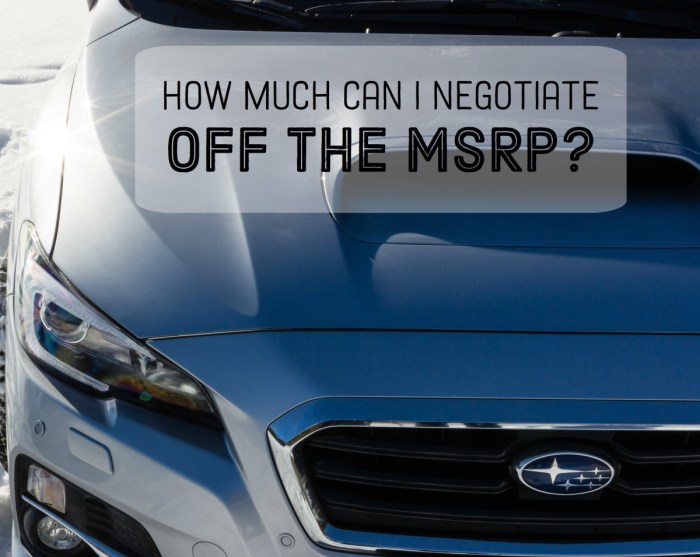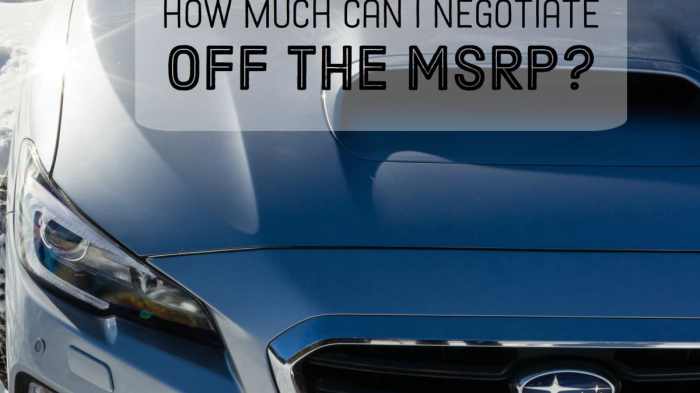How Much Can You Negotiate a New Car Price?
Factors Affecting New Car Price Negotiation
How much can you negotiate a new car price – Negotiating the price of a new car involves understanding various factors influencing your bargaining power. A strong negotiating position is built on knowledge and preparation. Several key elements significantly impact your ability to secure a favorable deal.
Factors Strengthening Buyer’s Negotiating Position
Several factors significantly enhance a buyer’s negotiating leverage. Possessing a strong understanding of market conditions, having pre-approved financing, and a good credit score are all advantageous. Additionally, demonstrating a willingness to walk away from a deal can be a powerful tool.
Market Conditions and Negotiation Leverage
Market conditions, particularly supply and demand, heavily influence negotiation outcomes. In a buyer’s market (high inventory, low demand), dealers are more willing to negotiate to move vehicles. Conversely, in a seller’s market (low inventory, high demand), their negotiating power increases, and discounts become less frequent. Inventory levels directly impact the urgency of the dealer to sell. Low inventory gives the dealer more leverage.
Cash Buyers vs. Financed Buyers
Cash buyers generally hold a stronger negotiating position. Dealers prefer quicker sales and avoid the complexities and potential risks associated with financing. However, securing pre-approved financing can also strengthen your position, allowing you to compare dealer financing offers and demonstrate your seriousness.
Credit Score’s Impact on Negotiation
A higher credit score translates to better financing terms and, indirectly, stronger negotiating power. Dealers are more likely to offer favorable deals to buyers with excellent credit, as it reduces their financial risk. A poor credit score, conversely, limits your options and weakens your negotiating position.
Factors Influencing Negotiation Outcomes

Source: saymedia-content.com
| Factor | Positive Impact on Negotiation | Negative Impact on Negotiation | Overall Impact |
|---|---|---|---|
| Market Conditions (Buyer’s Market) | High inventory, low demand allows for greater discounts. | Low inventory, high demand limits negotiation opportunities. | Significant |
| Payment Method (Cash) | Dealers prefer quick sales, leading to potential discounts. | Financing can complicate the process and reduce leverage. | Moderate to High |
| Credit Score | High credit scores lead to better financing terms and potentially lower prices. | Low credit scores limit financing options and weaken negotiating power. | Significant |
| Research and Knowledge | Understanding market value and dealer tactics strengthens your position. | Lack of research puts you at a disadvantage. | High |
Researching the Market Value
Thorough research is crucial for successful car price negotiation. Understanding the fair market price of your target vehicle empowers you to make informed decisions and avoid overpaying.
Step-by-Step Guide to Researching Fair Market Price
- Identify the specific make, model, year, and trim level of the car.
- Use online resources like Kelley Blue Book (KBB) and Edmunds to obtain pricing information.
- Consider the vehicle’s condition, mileage, and any additional features.
- Check local listings for similar vehicles to gauge pricing in your area.
- Compare prices from multiple sources to get a comprehensive picture of the fair market value.
Identifying Dealer Markups and Incentives
Dealers sometimes add markups to the manufacturer’s suggested retail price (MSRP). Researching the MSRP and comparing it to the dealer’s advertised price helps identify markups. Additionally, be aware of manufacturer incentives, rebates, and financing offers that can reduce the final price.
Strategies for Effective Online Research
- Use multiple online resources to cross-reference pricing information.
- Filter search results by year, make, model, trim, and mileage.
- Look for vehicles with similar features and condition to your target car.
- Pay attention to the listing dates to ensure you’re comparing current prices.
- Check for reviews and ratings to assess the reliability of the sources.
Negotiating Strategies and Tactics
Effective negotiation involves a combination of preparation, strategy, and skillful communication. A well-defined approach significantly improves your chances of securing a favorable deal.
Effective Negotiation Techniques
Successful car price negotiation involves presenting a confident yet respectful demeanor. Clearly stating your budget and desired price, while remaining open to reasonable counteroffers, is essential. Highlighting your research and knowledge of market value strengthens your position. Being prepared to walk away is a powerful negotiating tactic.
Establishing a Walk-Away Price
Before entering negotiations, determine your maximum acceptable price – your “walk-away price.” This prevents emotional decisions and ensures you don’t overspend.
Negotiation Approaches: Aggressive vs. Collaborative, How much can you negotiate a new car price
While an aggressive approach might work in some situations, a collaborative approach often yields better long-term results. Building a rapport with the salesperson can lead to a more mutually beneficial outcome.
Countering Common Dealer Tactics
Dealers often employ tactics to increase the sale price. Understanding these tactics and having prepared counterarguments is crucial. For example, if a dealer mentions a “low inventory,” you can counter by stating you’ve researched the market and know the fair price.
Successful Negotiation Process
Step 1: Research and preparation. Determine your desired price and walk-away price.
Step 2: Initial contact and presentation. Be confident and polite.
Step 3: Negotiate the price. Start with a lower offer than your target price.
Step 4: Discuss financing and add-ons. Negotiate interest rates and additional costs.
Step 5: Finalize the deal. Review all documents carefully before signing.
Dealing with Financing and Additional Costs: How Much Can You Negotiate A New Car Price
Financing significantly impacts the overall cost of a new car. Understanding various financing options and associated costs is crucial for making informed decisions.
Financing’s Impact on Overall Price
The interest rate and loan term significantly affect the total amount paid over the life of the loan. Lower interest rates and shorter loan terms reduce the total cost.
Hidden Costs and Fees
Be aware of hidden costs such as dealer preparation fees, destination charges, and other add-ons. Negotiate these fees, as they can significantly increase the final price. Examples include: dealer prep fees (often negotiable), destination charges (non-negotiable, but should be transparent), and various add-ons (extended warranties, paint protection, etc., all highly negotiable).
Negotiating Interest Rates and Loan Terms
Shop around for financing options from different lenders (banks, credit unions) before visiting the dealership. This gives you leverage to negotiate favorable interest rates and loan terms with the dealer.
Comparison of Financing Options
| Financing Option | Interest Rate | Loan Term (Years) | Monthly Payment |
|---|---|---|---|
| Dealer Financing | Variable (negotiable) | Variable (negotiable) | Variable |
| Bank Loan | Fixed or Variable | Variable | Variable |
| Credit Union Loan | Often lower than bank loans | Variable | Variable |
Negotiating Extended Warranties and Add-ons

Source: saymedia-content.com
Extended warranties and other add-ons are often high-profit items for dealers. Carefully evaluate their value and negotiate their price or consider forgoing them altogether.
Illustrative Scenarios and Examples
Real-world scenarios highlight the importance of preparation and effective negotiation strategies.
Successful Car Price Negotiation
A buyer, having researched the market value and secured pre-approved financing, approached a dealership with a confident yet respectful demeanor. They started their negotiation with a price lower than their target price, citing their research and the availability of similar vehicles at lower prices. Through collaborative discussion, they successfully negotiated a price below their walk-away price, securing a favorable deal.
Unsuccessful Car Price Negotiation
A buyer, lacking sufficient research, rushed into a dealership without a clear price in mind. They were easily swayed by the salesperson’s tactics and ended up paying significantly more than the fair market value. They regretted not setting a walk-away price and not being prepared to walk away from the deal.
Negotiating a new car price can be tricky, but knowing the dealer’s cost significantly improves your leverage. To get a head start, you can utilize resources like find invoice price of new car by vin to determine the vehicle’s actual invoice price. Armed with this information, you’ll be better positioned to negotiate a fair price and secure a better deal.
Successful Negotiation Tactics at Different Dealerships
Negotiating strategies can vary depending on the dealership’s reputation and sales approach. A more collaborative approach might work better with smaller, family-owned dealerships, while a more assertive approach might be necessary with larger, high-volume dealerships. Adapting your style to the situation is key.
Responding to Dealer Counter-Offers
When a dealer presents a counter-offer, carefully consider its terms. Don’t be afraid to counter back with your own revised offer, justified by your research and understanding of market value.
Image of a Successful Car Negotiation
The image depicts a buyer and salesperson shaking hands, both smiling, in front of a new car. The atmosphere is positive and collaborative, suggesting a successful negotiation where both parties feel they achieved a fair outcome. The buyer’s confident posture and the salesperson’s genuine smile convey mutual respect and satisfaction.
Top FAQs
What’s the best time of year to buy a new car?
The end of the month and quarter, and the end of the model year are generally considered the best times to negotiate, as dealerships often have quotas to meet.
Should I bring a friend or family member to help negotiate?
While helpful for moral support, it’s often best to negotiate yourself to maintain control of the conversation and ensure your preferences are clearly communicated.
What if the dealer won’t budge on the price?
Be prepared to walk away. Having a firm “walk-away” price in mind will help you avoid overpaying. Sometimes, a dealer will reconsider their offer if they sense you’re serious about leaving.
How can I avoid hidden fees?
Carefully review all paperwork before signing. Ask clarifying questions about any fees you don’t understand. Negotiate the price
-including* all fees upfront.





















